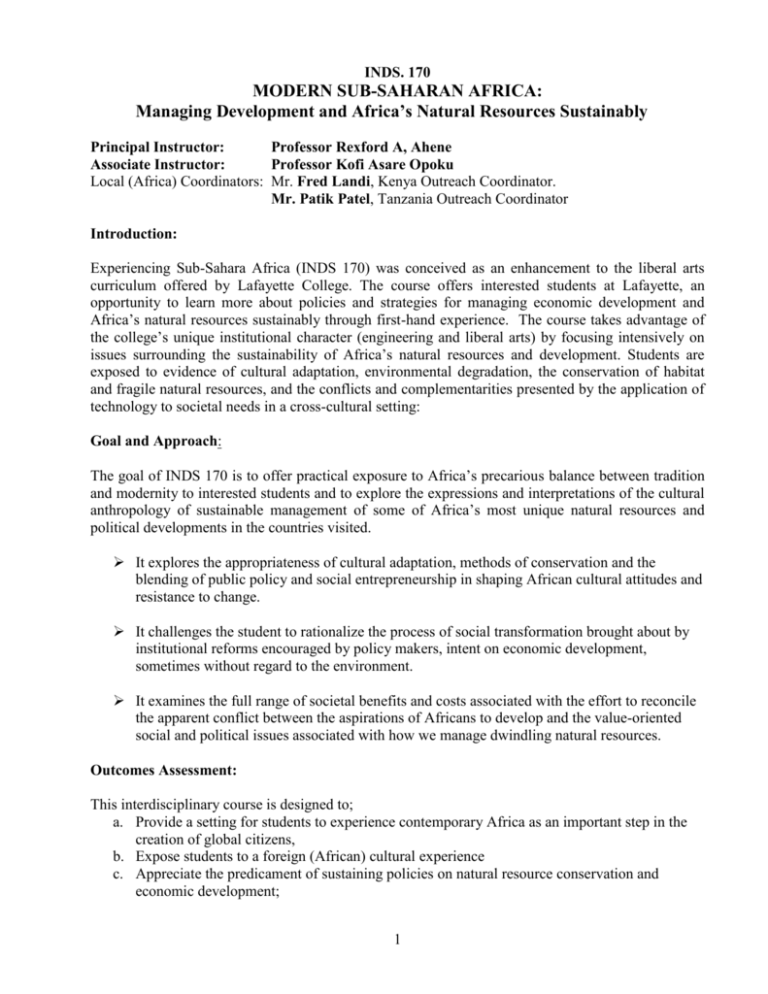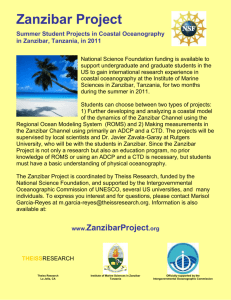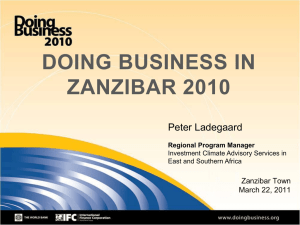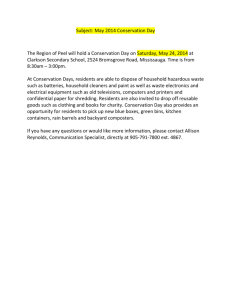INTERIM SESSION TO KENYA & TANZANIA
advertisement

INDS. 170 MODERN SUB-SAHARAN AFRICA: Managing Development and Africa’s Natural Resources Sustainably Principal Instructor: Professor Rexford A, Ahene Associate Instructor: Professor Kofi Asare Opoku Local (Africa) Coordinators: Mr. Fred Landi, Kenya Outreach Coordinator. Mr. Patik Patel, Tanzania Outreach Coordinator Introduction: Experiencing Sub-Sahara Africa (INDS 170) was conceived as an enhancement to the liberal arts curriculum offered by Lafayette College. The course offers interested students at Lafayette, an opportunity to learn more about policies and strategies for managing economic development and Africa’s natural resources sustainably through first-hand experience. The course takes advantage of the college’s unique institutional character (engineering and liberal arts) by focusing intensively on issues surrounding the sustainability of Africa’s natural resources and development. Students are exposed to evidence of cultural adaptation, environmental degradation, the conservation of habitat and fragile natural resources, and the conflicts and complementarities presented by the application of technology to societal needs in a cross-cultural setting: Goal and Approach: The goal of INDS 170 is to offer practical exposure to Africa’s precarious balance between tradition and modernity to interested students and to explore the expressions and interpretations of the cultural anthropology of sustainable management of some of Africa’s most unique natural resources and political developments in the countries visited. It explores the appropriateness of cultural adaptation, methods of conservation and the blending of public policy and social entrepreneurship in shaping African cultural attitudes and resistance to change. It challenges the student to rationalize the process of social transformation brought about by institutional reforms encouraged by policy makers, intent on economic development, sometimes without regard to the environment. It examines the full range of societal benefits and costs associated with the effort to reconcile the apparent conflict between the aspirations of Africans to develop and the value-oriented social and political issues associated with how we manage dwindling natural resources. Outcomes Assessment: This interdisciplinary course is designed to; a. Provide a setting for students to experience contemporary Africa as an important step in the creation of global citizens, b. Expose students to a foreign (African) cultural experience c. Appreciate the predicament of sustaining policies on natural resource conservation and economic development; 1 d. Produces a human capital academic core of students with African experience who can serve as resource persons in the classroom and in community with each other. e. Produce students able to understand the dichotomies of traditional culture, the political economy of poverty and public policies aimed at balancing the management of fragile ecological systems in Kenya and Tanzania. INDS 170 satisfies the Foreign Culture goal of Lafayette’s Goals Oriented curriculum. Its emphasis on non-western culture and its non-ethnocentric approach to learning introduces students to intellectual inquiry by engaging them in learning as active thinkers, speakers, and discussants. Required Reading List (Supplied to Registered Students): 1. “Conservation, Environment and Habitat: Land Policy and Tenure Structure.” Published for the Government of the Republic of Tanzania. By The Scandinavian Institute of African Studies, Uppasala, Sweden. 1992 2. Ernest Mwape, “Wildlife and Sustainable Development: Community Based Natural Resources Management and Sustainable Agriculture.” World Summit on Sustainable Development, Johanesburg, South Africa. June 2-3, 2003 3. Plants and Their Values and Use by Local People, Lake Manyara National Park reference paper. 4. P. H. Gulliver, Tradition and Transition in East Africa: Studies of the Tribal Element in the Modern Era. University of California Press, Berkely. 1971. 5. Robert. M Netting , “East African Pastoralists” in Cultural Ecology. Waveland Press Inc. 1965, pp 41 – 58. 6. Kwame Gyekye, African Cultural Values: An Introduction. Sankofa Publishing Co. Philadelphia. 7. Joseph Z.Z. Matowanyika, Indigenous Knowledge Systems and Natural Resources Management in Southern Africa.” 1995. IUCN Regional Social Policy Service, Harare, Zimbabwe. 8. Z. A. Ogutu, “Conflicts Over Resources: Saiwa Swamp National Park (Kenya) and its environs.” GeoJournal, Vol. 41: 1, 25 -31 9. Wildlife and Conservation Policy, Republic of Kenya. 2007 Course Evaluation: Critical Thinking Synopsis of the Literature Field Journal and Reaction to Presentations Individual Research Paper Participation 25% 20% 40% 15% Course Outline: Phase I: Pre-travel Orientation (September- November) - Review of Goals, Scope and Requirements for the course – Dates TBA - Travel, Health and Immunization Requirements – Dates set by Health Center - Synopsis of Recommended Literature – Due on the day of departure. - Detailed Travel Arrangements Phase II: Experiencing Sub-Sahara Africa Topics Covered: 2 The Africans: Social Organization, Traditions and Customs Language and Society: The Development of Linguistic Affinities Field Projects on History and Social Anthropology, Development. Lecture Demonstrations by local experts and performing groups. Music, Dance and Society Workshop and the Tabular Theatre Culture, Conservation and Development National Politics and Economic Development Policy Traditional Values and Cultural Transition Rural and Urban Lifestyles and Experiences Traditional communities and resource management approaches. Role and Relevance of Informal Education, Oral History, Folklore and African Systems of Thought Political Economy of Conservation and Resource Management Kenya National Parks and Wildlife Conservation Policy Tanzania National Parks and Wildlife Conservation Policies Indigenous Knowledge Systems and Natural Resources Management Conflicts Over Resources: Pastoral Lifestyles and Sustainability Grassland and Desert Ecology Field Study of Wildlife habitat Community Based Natural Resources Management and Sustainable Agriculture. Individual Project Research Time Participants and Student Led Discussions Research, Journal, and Group Presentations Evening Lecture and Rap Sessions Final Research Papers Format for Instruction: Lectures, discussion sessions and other forms of instruction will include the following salient features: As previously stated, the goal of the course is to increase cognitive knowledge about Africa and to develop keen insights and accurate perceptions of African culture and strategies for sustainable development through first hand experience. Each lecture will be followed by a directed discussion session in a semi-formal format that promotes free exchange of views. The goal is to provide maximum contact with people in their local environment. Hands-on workshops and scheduled performances will utilize early afternoon (1:00 – 3:00 p.m.) or early evening time slots to allow the instructors to use a less formal format. 3 Within reasonable limits, students can schedule individual research interviews with local citizens, experts and lecturers at locations visited and with the course instructors at any time. However, we also recognize the need for personal time, for which ample provision will be made in the daily schedule. The program will consider individual time for unsupervised activities and acquisition of personal experiences an essential ingredient of the total African experience. Exposure to urban and rural life will provide opportunities to develop a more accurate perception of African societies This integrated program of lectures, seminars, cultural activities and field trips, as well as the provisions being made for individual research and consultations is geared toward the full realization of the objectives of the course. Synopsis of the Literature: In preparing your synopsis of the background readings for this course, we want you to grapple with the complex realities that go beyond simplistic headlines. To contemplate the potential for suffering and devastations caused by draught and mismanagement, and discontent with inept governments and international marginalization. To evaluate whether, policy options presented has resulted in the systematic realization of the full potential, not only of the individual members of the society but the nation as a whole. You are also encouraged to contemplate ideas and approaches that illustrate how material from the readings can be used in your research to develop a critical and analytical research report. Use the elements of critical analysis to guide your review of the literature. A number of cognitive skills are involved in critical thinking that is fundamentally interrelated. Here are some elements of critical thinking that illustrate how the material from your literature can be viewed as you prepare to write a critical and analytical synopsis. 1. 2. 3. 4. 5. 6. 7. Differentiate between fact and opinion. Recognize and evaluate author bias and rhetoric. Determine cause and effect relationships. Determine the accuracy and completeness of information presented. Recognize logical fallacies and faulty reasoning. Comparing and contrasting information and points of view. Develop inferential skills and draw logical conclusion. Developing the power of critical and analytical thinking is the key to the understanding and use of information. It allows you to discuss and argue points of opinion and points of fact. Course Duration : January 03 – 25, 2012. Itinerary follows: 4 INTERIM SESSION TO KENYA & TANZANIA: January 03 – 18, 2012. Prepared for : Rexford Ahene, Lafayette College Consultation : Reference Validity Naked Wilderness Afrika : Kenya / Tanzania : 04 Jan – 17 Jan 2012 Itinerary at a Glance Day Location Accommodation Meals Activity 1 Nairobi Nairobi Safari Club DBB Trf 2 Nairobi Nairobi Safari Club L-DBB KWS Policy Research Lecture 3 Lake Naivasha Lake Naivasha Country Club LDBB Nat Res. Management Lecture 4 Lake Nakuru Nakuru Sopa Lodge LDBB Nat Res. Management Lecture 5 Amboseli Amboseli Sopa Lodge LDBB Nat Res. Sustainability Lecture 6 Arusha Impala Hotel LDBB Trf 7 Ngorongoro Ngorongoro Sopa Lodge LDBB TZ National Policy Lecture 8 Ngorongoro Ngorongoro Sopa Lodge LDBB Crater Ecology/Habitat 9 Lake Manyara L. Manyara Serena Lodge LDBB Olduvai Gorge- Historical Lect. 10 Zanzibar Tembo House Hotel L-DBB Flt, Trf, City & Spice Tour 11 Zanzibar Double Tree Zanzibar All Inc Trf 12 Zanzibar Double Tree Zanzibar All Inc Marine Ecosystem Mgnt. Lecture 13 Zanzibar Double Tree Zanzibar All Inc Indv. Research & Consultation 14 Dar/Depart B,L-DTrf, Ferry, CSS _____________________________________________________________________________________________ BB – bed and breakfast, LDBB = lunch, dinner, bed and breakfast, Lect. = Arranged Lecture PP – Policy Presentation, Trf – Transfers, A- Morning Safari, P – Afternoon Safari, Flt - Flight _____________________________________________________________________________________________ Tuesday. 03 January 2012 – Depart from Newark Liberty International Airport. Wednesday. 04 January 2012 – Nairobi Arrive at Jomo Kenyatta International Airport, assisted by a Naked Wilderness Afrika representative. Transfer to your Nairobi Hotel which is situated within the city centre. Overnight at Nairobi Safari Club on half board basis. (D) Thursday, 05 January 2012 – Nairobi Lecture I: Land Resources Management and Conservation Policy (Kenya) @ KWS Auditorium Lecture II: Sustainable management of wildlife and habitat preservation @ Giraffe Conservation Ctr. Breakfast at your hotel. Go on an orientation tour of Municipal Nairobi, including central business district, the traditional craft center, the former site of the US Embassy. This will be followed by Land Policy discussion at University of Nairobi. Lunch break. Afternoon lecture by the KWS staff on Park Management and Conservation. Proceed to Karen Blixen museum and evening lecture at the Giraffe Conservation Centre. Return to the hotel. Dinner at the hotel. Overnight at Nairobi Safari Club on full board basis. (B,L,D) Friday, 06 January 2012 – Lake Naivasha and Crescent Island Field Trip: Park Ecology and Habitat Sustainability (Human/Animal Conflict Management) Evening Discussion: Sustainable Resources Management Options. After breakfast depart from Nairobi at 08:30hrs and take a short scenic drive to Lake Naivasha which is the highest and purest of the Rift Valley lakes. Lake Naivasha is famous for its horticulture farming and you will take this opportunity to visit one or two flower farms. Lunch at the club. This afternoon take a boat ride on the lake to explore the Lake Naivasha ecosystem preservation and breeding grounds of pelicans, fish eagles, and cormorants including management of the primeval wildlife on Crescent Island. Dinner and overnight at Lake Naivasha Country Club. 5 Saturday, 07 January 2012 – Lake Nakuru National Park/Lake Naivasha Field Observation I: Human/Wildlife Interaction management strategies I Evening Lecture: Practical approaches and Challenges to Natural Resources Management in the field. After breakfast drive to Lake Nakuru National Park. Lunch at Sarova Lion Hill Lodge. After lunch drive through LAKE NAKURU NATIONAL PARK, famous for its pink flamingos. Observe the alkaline water ecosystem that sustains thousands of water birds; see the panoramic view from the top of Baboon Rocks. This park also houses the KWS research center for Rhino breeding and restocking. Return to Lake Naivasha Country Club for dinner, lecture and overnight. Sunday, 08 January 2012 – Amboseli National Park After breakfast, drive over the Athi Plains (4.0 hours), and enter AMBOSELI CONSERVATION AREA with your notebooks and cameras ready to document and discuss various natural resources management and conservation strategies and options. The park is situated at the foot of the impressive snow-capped peak of Mt. Kilimanjaro, Africa’s highest mountain at 19,340 feet. Afternoon leisure time followed by early evening review and synthesis of week 1 lectures and field observations. Amboseli Sopa Lodge Monday, 09 January 2012 – Amboseli National Park Field Observation II: Human/Wildlife Interaction management strategies II. Evening Discussion: Natural Resources Management and Conservation Strategies in the field. Breakfast at the lodge. Embark on all day guided Field Observation trip accompanied by the resident Research Scientist to observe and discuss various park management challenges, on-going research and monitoring stations for managing wildlife population and ecological balance. The park offers a wide variety of wildlife but the principal attraction is its vast herds of elephant within the park and in close proximity to human settlements. Other game includes: zebra, wildebeest, giraffe, impala, leopard, caracal and serval cat. This park also boasts a rich bird life such as ibis, egret, avocet, common and saddle-billed stork, secretary bird, heron, vultures, ducks, and geese. Overnight Amboseli Sopa Lodge (B,L,D) Tuesday, 10 January 2012 – Arusha: Arusha Tour: Visit the United Nations Convention Center and Tanzania Culture and Craft Center Lecture presentation: Tanzania Parks Policy & Management Challenges. After breakfast drive to the border post of Namanga, clear the immigration formalities, and proceed to Arusha, Tanzania. Afternoon visit to the Arusha cultural center. Evening lecture and discussion of Tanzania Parks and Wildlife Management Policy. Overnight at Naura Springs Hotel on full board basis. (B,L,D) Wednesday, 11 January 2012 – Travel to Ngorongoro Crater Early breakfast and depart by road through the Ngorongoro Highlands to your lodge situated on the rim of the crater. The crater covers over 250 square kilometres (over 100 square miles) of land and is the home of the rare black rhino, prides of lion, elephant, cheetah and great herds of buffalo, antelope and wildebeest. Overnight at Ngorongoro Sopa Lodge on full board basis. (B,L,D) Thursday, 12 January 2012 – Ngorongoro Crater: All day Field Tour: Field Observation: Sustainable Community based Conservation and Degradation Mitigation Strategies. Lecture/Discussion: The Dilemma of Conservation and Poverty Alleviation in Tanzania After breakfast, descend 600m (0ver 2000 feet) to the floor of the crater for a full day crater tour with picnic lunch. Examine how the park sustains the natural order through the law of nature. Explore the forest areas that are inhabited by monkey and elephant, the lake area, where you may see the flamingos and the open savannah where the rare black rhino competes to survive and lions hunt for food. Overnight at Ngorongoro Sopa Lodge on full board basis. (B,L,D,) Friday, 13 January 2012 – Lower Serengeti/Lake Manyara: Field Trip: Historical Tour of Olduvai Gorge- cradle of humanity. 6 Discussion: Maniyata (Masai settlements) in the Park – Interdependent Species and Interactions. After an early morning breakfast, drive over the rim to mingle with the herds for the great migration through the Serengeti plains, continuing for a historical tour of Olduvai gorge. Note: The migration cycle for wilderbeest, gazelles, zebras and buffalo brings them to the lower Serengeti in January, attracting the big cats, hyenas and other predators, making the lower Serengeti the best wildlife viewing area in January. Return in time for an evening lecture at your lodge. Overnight at Lake Manyara Serena Lodge on full board ( B, L,D) Saturday, 14 January 2012 – Zanzibar: Stone City Guided Tour: Stone Town History: Pre-colonial, Colonial and Post Colonial Development Group Discussion: History of Cultural Acculturation: Swahili, a new universal African language Depart after breakfast for Arusha. Lunch in Arusha, followed by a scheduled flight (departing at 14h.25) to Zanzibar. This ancient island was once ruled by sultans of Oman; European explorers considered it their stepping stone into the African Interior. On arrival you will be met and transferred to your overnight hotel. After lunch, you will be led on a half-day guided tour of the historical town. The architecture of the stone town captivates the eye. Wooden Arab doors are ornately carved, some with pointed brass bosses. There is so much history to Zanzibar that you find acute juxtapositions. The Cathedral church was built over the former slave market, its high altar on the site of the whipping post. Return to Tembo House Hotel for overnight stay on half board basis. (B, L-, D) Sunday, 15 January 2012 – Zanzibar: North West Coast Field Trip: Sustainable management of history and economy of Zanzibar. Evening Discussion: Managing Zanzibar’s Coral Marine Park, North West Coast. Depart after breakfast drive through the countryside to visit the spice plantations with an opportunity to pick, smell and savor exotic fruits and spices. After the excursion you will end up at your hotel for the next 2 nights for Student/Faculty consultations, independent research and synthesis of course experiences at Double Tree - Zanzibar on All inclusive basis Monday, 16 January 2012 – Zanzibar: North west Coast Lecture: Costal Marine Ecosystem Management, Conservation Policies and Strategies. Wrap-up Discussion: Open discussion and final comments on all aspects of the course. Breakfast at your hotel, attend scheduled lectures and instruction on marine park conservation and habitat management. Rest of the day is for leisure to laze around the pool or complete your journal entries, field research and interviews. Faculty advisors will be available for consultations. Overnight at Double Tree - Zanzibar on All inclusive basis Tuesday, 17 January 2012 – Dar-es-Salaam: African Urban Lifestyles and Orientation: Depart After breakfast, transfer back to Stone Town and on to the Jetty to take a Ferry across to Dar es Salaam. On arrival in Dar-es-Salaam, the group bus will be ready for the final shopping drive to see the city of Dar es salaam. Lunch and dinner will be provided before transfer to the Airport for the flight back to the USA. Wednesday, 18 January 2012 – Return to Newark International Airport. Thursday, 19 – 27, January 2012 Student/Faculty discussion of individual research paper projects, additional library research and literature review and submission of INDS 170 Journals and Final Research Papers. 7 NETT PRICES IN US DOLLARS MINIMUM 24 STUDENTS + 2 PROFESSORS Validity Per Person Sharing Single Room Supplement 2900 630 04 January – 17 January 2012 Price Includes Accommodation as mentioned in the itinerary 3 meals daily on safari except on day 1 Transport in 8 seater minibuses in Kenya and 4x4 Land cruisers in Tanzania, game drives, park entrance fees for clients, drivers and vehicles. At Double Tree, Zanzibar, drinks are included as well as all the three meals. Transfers as indicated on the itinerary One way flight from Arusha to Zanzibar One way Ferry from Zanzibar to Dar es salaam Day 2 - Lunch at Carnivore, Nairobi Half day Stone City and spice tour. Bottled water on road safaris Price Excludes Gratuity, porterage, beverages, items of personal nature such as laundry, phone, fax etc. International flights, visas and airport taxes Any other item not mentioned in the itinerary TANZANIA & ZANZIBAR:Yellow Fever Certificate is Mandatory at the point of entry. 2012 INDS 170 Budget attached. 8






